A&S Faculty News
Fall 2018
December 2018
D'Auria Looking to Make Meds in Space
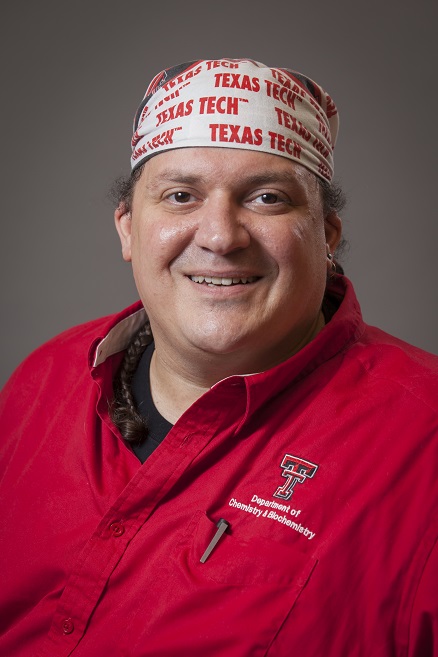 John D'Auria, an assistant professor in the Department of Chemistry & Biochemistry,
is looking for ways to make plant-based medicines in outer space—an environment decidedly
hostile to plants: no soil, no water, no oxygen, no sunlight. Many medicines used
on Earth depend on chemicals that come from plants, so any realistic chance for future
space exploration will require a way to treat illnesses without making a pharmacy
run back "home." According to a study published Dec. 11 in the online journal Nature Communications, D'Auria and his colleagues report that,
by discovering the genes and enzymes plants use to form the second ring in tropane
alkaloids' core structure, they will be able to develop new, novel ways to produce
these important chemicals. "The bigger picture here is certainly the ability to start
making these compounds in organisms that usually don't make them, for example bacteria,
yeast and other plants," D'Auria said. "Compounds like this are great candidates for
engineering in yeast or bacteria because we can then use them as substitutes for classical
organic synthesis for the prospects of space exploration." He went on to add that
space has no petrochemicals, either. "That means if we want to make complex organic
molecules, we will need to use bacteria, yeasts and plants to make them for us. This
is the ultimate goal of our grant, and the paper is a major step on that road." Also
working in the research team are Horn Professor Guigen Li and associate professor
Michael Findlater, both from Texas Tech; and Cornelius Barry, Matt Bedewitz and Daniel
Jones from Michigan State University.
John D'Auria, an assistant professor in the Department of Chemistry & Biochemistry,
is looking for ways to make plant-based medicines in outer space—an environment decidedly
hostile to plants: no soil, no water, no oxygen, no sunlight. Many medicines used
on Earth depend on chemicals that come from plants, so any realistic chance for future
space exploration will require a way to treat illnesses without making a pharmacy
run back "home." According to a study published Dec. 11 in the online journal Nature Communications, D'Auria and his colleagues report that,
by discovering the genes and enzymes plants use to form the second ring in tropane
alkaloids' core structure, they will be able to develop new, novel ways to produce
these important chemicals. "The bigger picture here is certainly the ability to start
making these compounds in organisms that usually don't make them, for example bacteria,
yeast and other plants," D'Auria said. "Compounds like this are great candidates for
engineering in yeast or bacteria because we can then use them as substitutes for classical
organic synthesis for the prospects of space exploration." He went on to add that
space has no petrochemicals, either. "That means if we want to make complex organic
molecules, we will need to use bacteria, yeasts and plants to make them for us. This
is the ultimate goal of our grant, and the paper is a major step on that road." Also
working in the research team are Horn Professor Guigen Li and associate professor
Michael Findlater, both from Texas Tech; and Cornelius Barry, Matt Bedewitz and Daniel
Jones from Michigan State University.
October 2018
Lima Named Poet of The Year
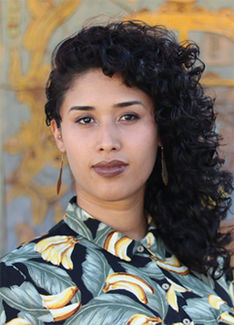 Rossy Evelin Lima, a visiting assistant professor in the Department of Classical &
Modern Languages & Literatures, received the Poet of the Year Award at the Instituto
Cervantes in New York, The Americas Poetry Festival of New York (TAPFY) on Oct. 12,
2018. The director of TAPFNY, Carlos Aguasaco, and orgranizers Yrene Santos and Carlos
Velásquez Torres, granted Lima the award "in recognition for her literary achievements
and for her poetry that reflects the dreams of her generation and the true spirit
of the Americas." She was selected from a roster of 43 distinguished poets from around
the world representing 18 countries and seven languages. Lima is the author of the
bilingual poetry collection "Migrare Mutare / Migrate Mutate" (Artepoetica Press,
2017) and the trilingual children's book "Noyolkanyolkej." Her work has been published
in numerous journals, magazines and anthologies in nine countries. Lima's other recognitions
include the Premio Internazionale La Finestra Eterea award (Milan, Italy, 2017); the
Premio Orgullo Fronterizo Mexicano award by the Institute for Mexicans Abroad (Texas,
2016); the Premio Internazionale di Poesia Altino award (Venice, Italy, 2015); and
the National Gabriela Mistral Award by the Hispanic Honor Society (USA, 2010), among
others. She is the president and founder of the Latin American Foundation for the
Arts, the founder of the International Latin American Poetry Festival (FeIPoL), and
the founder of Jade Publishing.
Rossy Evelin Lima, a visiting assistant professor in the Department of Classical &
Modern Languages & Literatures, received the Poet of the Year Award at the Instituto
Cervantes in New York, The Americas Poetry Festival of New York (TAPFY) on Oct. 12,
2018. The director of TAPFNY, Carlos Aguasaco, and orgranizers Yrene Santos and Carlos
Velásquez Torres, granted Lima the award "in recognition for her literary achievements
and for her poetry that reflects the dreams of her generation and the true spirit
of the Americas." She was selected from a roster of 43 distinguished poets from around
the world representing 18 countries and seven languages. Lima is the author of the
bilingual poetry collection "Migrare Mutare / Migrate Mutate" (Artepoetica Press,
2017) and the trilingual children's book "Noyolkanyolkej." Her work has been published
in numerous journals, magazines and anthologies in nine countries. Lima's other recognitions
include the Premio Internazionale La Finestra Eterea award (Milan, Italy, 2017); the
Premio Orgullo Fronterizo Mexicano award by the Institute for Mexicans Abroad (Texas,
2016); the Premio Internazionale di Poesia Altino award (Venice, Italy, 2015); and
the National Gabriela Mistral Award by the Hispanic Honor Society (USA, 2010), among
others. She is the president and founder of the Latin American Foundation for the
Arts, the founder of the International Latin American Poetry Festival (FeIPoL), and
the founder of Jade Publishing.
Hayhoe to Speak at Nobel Peace Forum in December
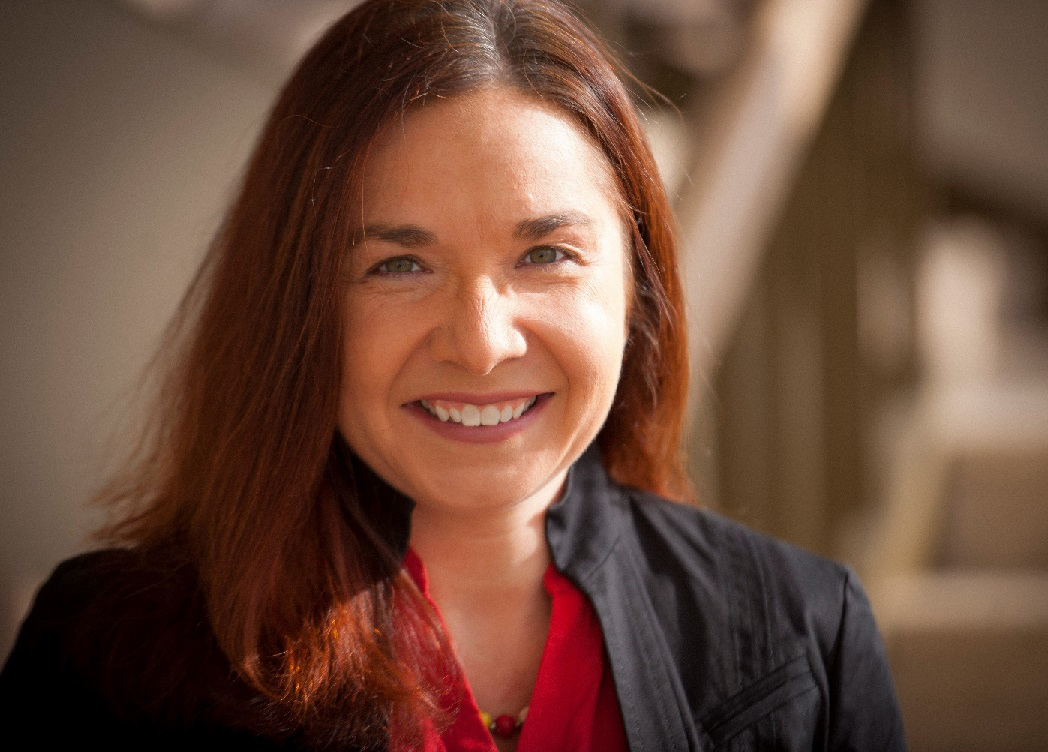
Katharine Hayhoe, professor in the Department of Political Science and co-director of TTU's Climate Science Center, has been invited to participate in one of the most distinguished forums in the world by the Norwegian Nobel Institute. Hayhoe will join other world leaders on climate science, policy and solutions as part of the 2018 Nobel Peace Prize Forum Oslo at the University of Oslo, Norway. The forum, scheduled for Dec. 11 and titled "How to Solve the Climate Crisis in Time," will follow the keynote speech delivered by former U.S. vice president and 2007 Nobel Peace Prize laureate Al Gore. "I'm honored to participate in this event, and I appreciate the decision of the Nobel Peace Prize Forum to use this event to highlight the urgency of a changing climate," Hayhoe said in an Oct. 11 Texas Tech Today article. "Just last week, the Intergovernmental Panel on Climate Change released its latest report, detailing in stark terms the future of our world if we don't take immediate action to reduce carbon emissions. A global conversation about how we can sensibly and safely accomplish this goal is exactly what we need right now." Past keynote speakers for this event have included former U.S. Secretary of State Henry Kissinger, former U.S. National Security Advisor Zbigniew Brzezinski, and Riboberta Menchú Tum, a human rights activist from Guatemala. The forum will be streamed live by Nobel Media and will be accessible on YouTube.
Lewis Speaks on 'Civil Counterpoints' Panel
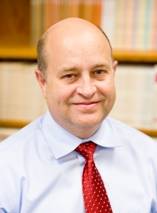 Col. David Lewis, USAF (Retired), director of the strategic studies graduate program
in the Department of Political Science, headed a panel of guest speakers Oct. 1 at
"Global (Dis)order? The U.S. Role in International Affairs." This was the sixth installment
of the Civil Counterpoints series, held at Texas Tech University. Discussion, like
all in the series, was designed to encourage civility and open-mindedness in public
discourse of controversial topics. The evening's program addressed questions such
as, "Is 'America First' America's best? Do traditional alliances still matter? Does
'free trade' promote international partnerships and peace or inequality and class
warfare? Can the United States be a world leader without securing its own borders?"
Joining Lewis on the panel were Jamie Bologna Pavlik, a research fellow at TTU's Free
Market Institute and an assistant professor of agricultural and applied economics
in the College of Agricultural Sciences and Natural Resources(CASNR) Robert Murphy,
a research assistant professor in TTU's Free Market Institute; and Mark Tokola, vice president of the Korea Economic Institute of America in Washington, D.C. Jorge Ramírez, the Walter and Anne Huffman Professor of Law in
the Texas Tech School of Law, served as moderator.
Col. David Lewis, USAF (Retired), director of the strategic studies graduate program
in the Department of Political Science, headed a panel of guest speakers Oct. 1 at
"Global (Dis)order? The U.S. Role in International Affairs." This was the sixth installment
of the Civil Counterpoints series, held at Texas Tech University. Discussion, like
all in the series, was designed to encourage civility and open-mindedness in public
discourse of controversial topics. The evening's program addressed questions such
as, "Is 'America First' America's best? Do traditional alliances still matter? Does
'free trade' promote international partnerships and peace or inequality and class
warfare? Can the United States be a world leader without securing its own borders?"
Joining Lewis on the panel were Jamie Bologna Pavlik, a research fellow at TTU's Free
Market Institute and an assistant professor of agricultural and applied economics
in the College of Agricultural Sciences and Natural Resources(CASNR) Robert Murphy,
a research assistant professor in TTU's Free Market Institute; and Mark Tokola, vice president of the Korea Economic Institute of America in Washington, D.C. Jorge Ramírez, the Walter and Anne Huffman Professor of Law in
the Texas Tech School of Law, served as moderator.
September 2018
Weiss Receives $700,000 Tornado Research Grant
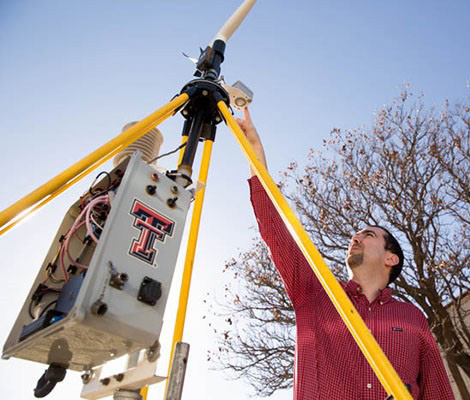 Chris Weiss, professor of atmospheric science in the Department of Geosciences, has
received a research grant of almost $700,000 from the National Science Foundation.
The money will fund "Targeted Observation by Radars and Unmanned Aircraft Systems
of Supercells" (TORUS). According to a Sept. 18 article originally published by Texas
Tech Today, this research will take place during May-June of 2019 and 2020, and is
the third step of an intercollegiate project with the University of Colorado and the
University of Nebraska. The effort focuses on the development of new technologies
and strategies that can be used to intelligently sample the atmosphere with novel
in situ and radar measurements. The TORUS project will take the developed technologies
and use them to gather an improved understanding and prediction of tornadoes within
severe thunderstorms.
Chris Weiss, professor of atmospheric science in the Department of Geosciences, has
received a research grant of almost $700,000 from the National Science Foundation.
The money will fund "Targeted Observation by Radars and Unmanned Aircraft Systems
of Supercells" (TORUS). According to a Sept. 18 article originally published by Texas
Tech Today, this research will take place during May-June of 2019 and 2020, and is
the third step of an intercollegiate project with the University of Colorado and the
University of Nebraska. The effort focuses on the development of new technologies
and strategies that can be used to intelligently sample the atmosphere with novel
in situ and radar measurements. The TORUS project will take the developed technologies
and use them to gather an improved understanding and prediction of tornadoes within
severe thunderstorms.
Anderson May Hold Record for Service
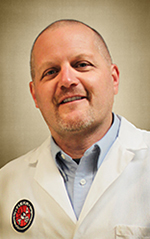 Todd Anderson, professor in the Department of Environmental Toxicology, received the
Outstanding Regional Chapter Member Award for 2018 from the Society of Environmental Toxicology and Chemistry (SETAC). Anderson served the South Central Regional Chapter as treasurer for 17 years
and organized/chaired three regional meetings during that time: one in Lubbock and
two at TTU-Junction. The award has been presented annually since 2007 to a regional
chapter member of SETAC who has consistently contributed to the development or functioning
of the Society at the regional chapter level. Also, Anderson has stepped down as chair
of the Awards Committee in the Environmental Chemistry Division of the American Chemical Society (ACS). He served in that capacity for 21 years. The Awards Committee exists to administer
the division's award programs, which are heavily focused on graduate students. "I
don't think they keep records of such things, but if they did, that would be a record,"
Anderson said of his length of service, adding that before his tenure, the normal
service as chair of that committee has historically been three to four years. "My
record may stand for a while—at least for the next 21 years," he said.
Todd Anderson, professor in the Department of Environmental Toxicology, received the
Outstanding Regional Chapter Member Award for 2018 from the Society of Environmental Toxicology and Chemistry (SETAC). Anderson served the South Central Regional Chapter as treasurer for 17 years
and organized/chaired three regional meetings during that time: one in Lubbock and
two at TTU-Junction. The award has been presented annually since 2007 to a regional
chapter member of SETAC who has consistently contributed to the development or functioning
of the Society at the regional chapter level. Also, Anderson has stepped down as chair
of the Awards Committee in the Environmental Chemistry Division of the American Chemical Society (ACS). He served in that capacity for 21 years. The Awards Committee exists to administer
the division's award programs, which are heavily focused on graduate students. "I
don't think they keep records of such things, but if they did, that would be a record,"
Anderson said of his length of service, adding that before his tenure, the normal
service as chair of that committee has historically been three to four years. "My
record may stand for a while—at least for the next 21 years," he said.
Wenthe Reading Launches This Year's Series
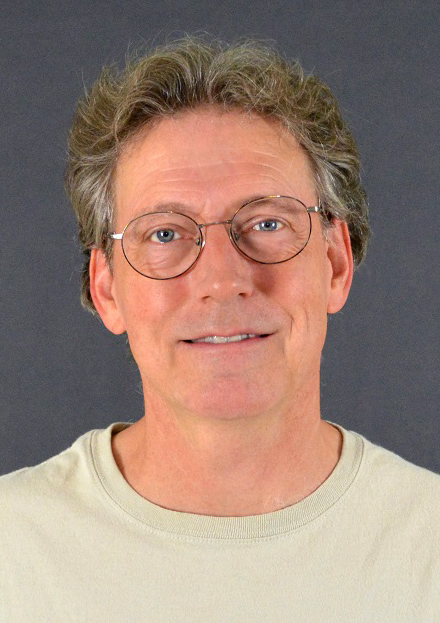 William Wenthe, professor in the Department of English and Lubbock's first poet laureate,
read from his recent works on Sept. 6, as the Department of English began its 2018-19
TTU Creative Writing Program Reading Series. Wenthe has authored four books of poems:
"God's Foolishness" in 2016; "Words Before Dawn" in 2012; "Not Till We Are Lost" in
2003; and "Birds of Hoboken" in 1995. "Not Till We Are Lost" won the Best Book of
Poetry Award from the Texas Institute of Letters. His awards include fellowships from
the National Endowment for the Arts and Texas Commission on the Arts, and two Pushcart
Prizes. Wenthe has published poems in journals including Poetry, The Paris Review,
The Georgia Review, Tin House, Orion, TriQuarterly, and The Southern Review. In addition,
he teaches 20th Century British Poetry and has written articles on Yeats, H. D., poetic
form and literary theory. Jessica Smith, a PhD student in English & Creative Writing,
also read from her works at the event, as did Robby Taylor, a PhD student in Literature
& Creative Writing.
William Wenthe, professor in the Department of English and Lubbock's first poet laureate,
read from his recent works on Sept. 6, as the Department of English began its 2018-19
TTU Creative Writing Program Reading Series. Wenthe has authored four books of poems:
"God's Foolishness" in 2016; "Words Before Dawn" in 2012; "Not Till We Are Lost" in
2003; and "Birds of Hoboken" in 1995. "Not Till We Are Lost" won the Best Book of
Poetry Award from the Texas Institute of Letters. His awards include fellowships from
the National Endowment for the Arts and Texas Commission on the Arts, and two Pushcart
Prizes. Wenthe has published poems in journals including Poetry, The Paris Review,
The Georgia Review, Tin House, Orion, TriQuarterly, and The Southern Review. In addition,
he teaches 20th Century British Poetry and has written articles on Yeats, H. D., poetic
form and literary theory. Jessica Smith, a PhD student in English & Creative Writing,
also read from her works at the event, as did Robby Taylor, a PhD student in Literature
& Creative Writing.
Corsi Team Detects Superfast Jet Material from Neutron Star Merger
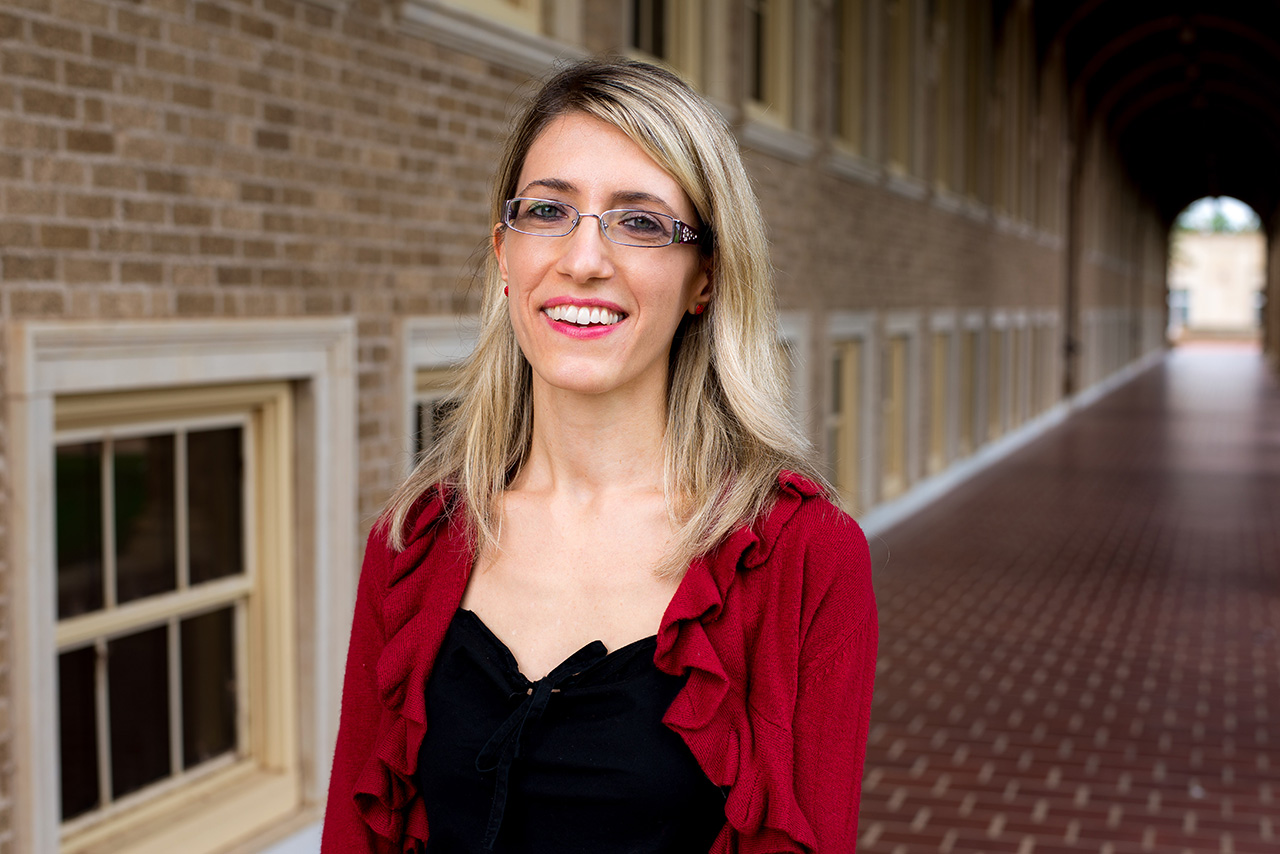
Alessandra Corsi, an associate professor in the Department of Physics & Astronomy, is on the team of astrophysicists who are the first to use both gravitational waves and electromagnetic waves to detect a superfast jet of material from a neutron star merger. Their findings, published Sept. 5 in the online version of the journal Nature, were confirmed by radio observations. "After our very first detection of a radio glow from the neutron star, our team continued to monitor this fantastic event for months," Corsi was quoted as saying in a Sept. 5 Texas Tech Today article. "We not only continued to track the evolution of the radio light curve, but also employed techniques such as radio polarimetry and Very Long Baseline Interferometry (VLBI) to probe the structure of the ejecta in detail. This VLBI result is particularly exciting as it reveals that jets formed in binary neutron star mergers can have a more complex structure than previously thought." The neutron star merger gave rise to the gravitational wave event GW170817, which was observed by orbiting and ground-based telescopes around the world. Scientists watched as the characteristics of the received waves changed with time, then used the changes as clues to reveal the nature of the phenomena that followed the merger. The detection of a fast-moving jet in GW170817 greatly strengthens the connection between neutron star mergers and short-duration gamma-ray bursts, the scientists said. They added that the jets need to be pointed relatively closely toward the Earth for the gamma-ray burst to be detected. "We were lucky to be able to observe this event, because if the jet had been pointed much farther away from Earth, the radio emission would have been too faint for us to detect," said Gregg Hallinan of Caltech, one of the astrophysicists on the research team.
Akchurin Becomes Associate Dean for Research
Nural Akchurin, professor and high-energy particle physicist, moves from his position as chair of the Department of Physics & Astronomy to become the College of Arts & Sciences' new associate dean of research, effective Sept. 1. He has been working on the Compact Muon Solenoid experiment using the Large Hadron Collider at CERN, the European Organization for Research, since 1994. One of the highlights of his work there was the 2012 discovery of the Higgs boson, a fundamental particle and a game-changer in particle physics because all particles acquire their masses via the Higgs boson. The discovery was awarded the 2013 Nobel prize in physics. Akchurin's current research focuses on uncharted territories at the high-energy frontier, including dark matter and dark energy. He also is leading the high-granularity silicon detector development for the next-generation experiments at CERN.
Bradatan Becomes Chair of SASW
Cristina Bradatan, associate professor of sociology, returns from a Fulbright Scholarship in Romania to become chair of the Department of Sociology, Anthropology & Social Work, effective Sept. 1. She specializes in migration and human-environment interaction and also is a faculty member in the Texas Tech Climate Science Center. Bradatan spent the spring semester interviewing farmers in three rural Romanian communities and collecting literature to understand what makes people cooperate when faced with environmental problems, specifically drought.
Mulligan Becomes Chair of Geosciences
Kevin Mulligan, associate professor of geography, becomes chair of the Department of Geosciences, effective Sept. 1. He is a faculty member in the Center for Geospatial Technology and adviser for the graduate certificate program in Geographic Information Science and Technology. Mulligan specializes in the environmental and geographic issues of West Texas and the southern Great Plains, with research projects including mapping the Ogallala Aquifer and projecting its usable lifetime, mapping changes in agricultural land use, and mapping the development of wind energy across the region.
Lee Becomes Interim Chair of Physics & Astronomy
Sung-Won Lee, professor and high-energy particle physicist, becomes interim chair of the Department of Physics & Astronomy, effective Sept. 1. Lee is a member of Texas Tech's experimental High Energy Physics group. Lee works with the Large Hadron Collider at CERN, the European Organization for Research, to try to discover the fundamental building blocks of the physical world and answer some of the most profound questions about the structure of matter and the evolution of the universe. His approach combines two main lines of research: improving the detector's sensitivity and using the detector in detailed studies of the Standard Model Higgs boson, in precision measurements of Standard Model physics and in searches for physics beyond the Standard Model at the energy frontier.
Pereira-Muro Becomes Chair of CMLL
Carmen Pereira-Muro, professor of Spanish language and literature, will becomes the new chair of the Department of Classical & Modern Languages & Literatures, effective Sept. 1. She has served as recruiter for the Spanish graduate program, a fellow of the Texas Tech Humanities Center and associate department chair since 2015. Pereira-Muro's research focuses on Spanish 18th- and 19th-century literature and culture, Romantic and post-Romantic poetry, gender and nationalism, Spanish cultural studies and Galician studies.
Zak Becomes Interim Chair of Biological Sciences
John Zak, professor of biology, moves from his position as associate dean of research for the College of Arts & Sciences to become the interim chair of the Department of Biological Sciences, effective Sept. 1. He also is co-director of the Texas Tech Climate Science Center and Texas Tech's principle investigator for the regional South Central Climate Adaptation Science Center. Zak is a soil microbial ecologist whose research seeks to understand how climate variability and human disturbances regulate soil microbial diversity and activity from the cotton fields of West Texas to the Chihuahuan Desert at Big Bend National Park. His lab is focused on understanding how soil microbial dynamics and processes are critical for ensuring that these systems are sustainable for future generations.
College of Arts & Sciences
-
Address
Texas Tech University, Box 41034, Lubbock, TX 79409-1034 -
Phone
806.742.3831 -
Email
arts-and-sciences@ttu.edu
